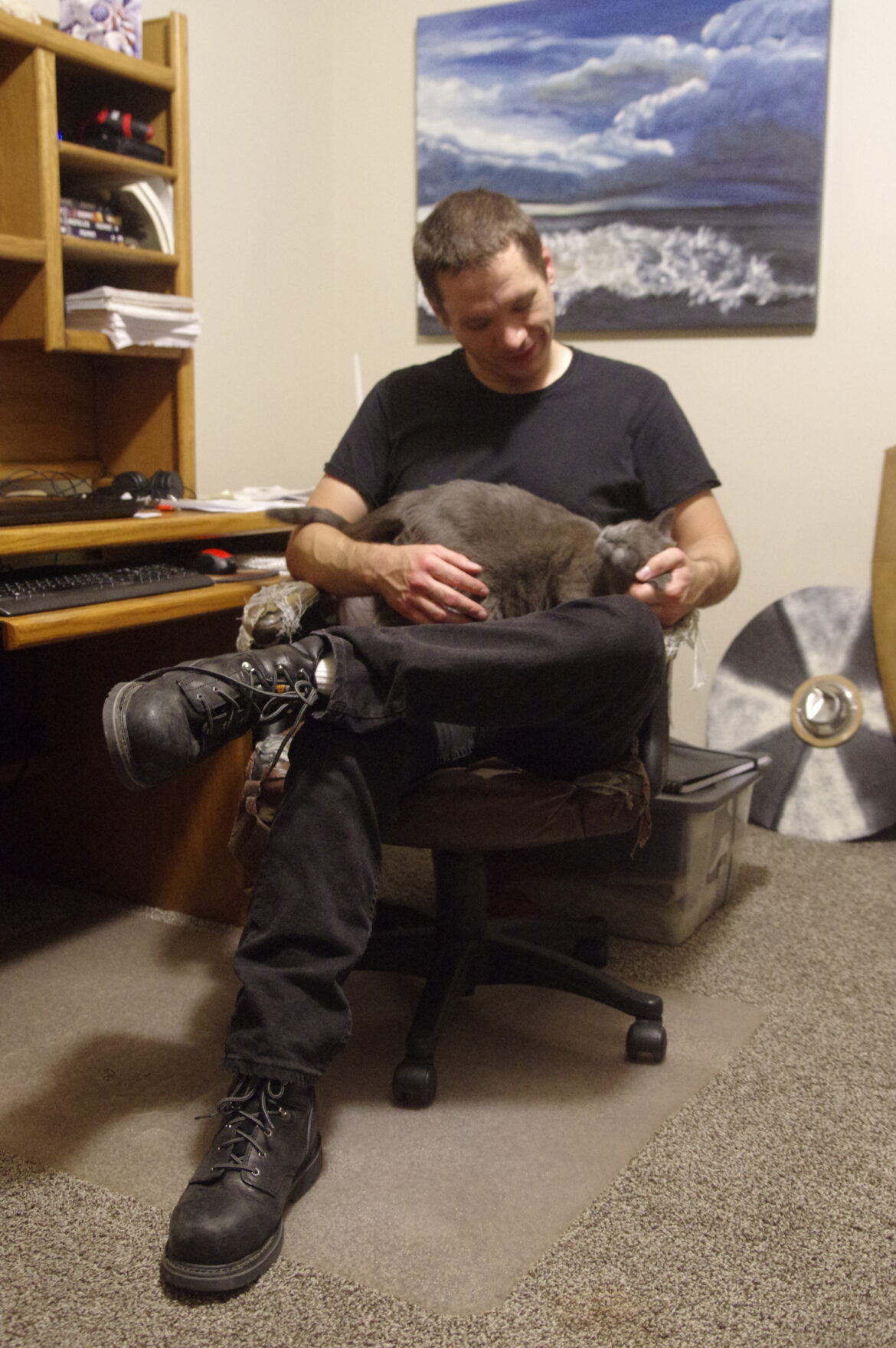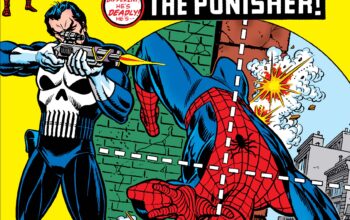Hello, Geeky Friends! I recently had the pleasure of interviewing fellow book enthusiast, Dodge Merrin, about his recently published book, Humble Glory. We also discussed his method for writing female characters and what he’s working on for future projects. Read on for a fascinating dive into this author’s perspective, plus a bonus excerpt from Merrin’s latest novel! — Mandy Collins
Introduction to Dodge Merrin and his works
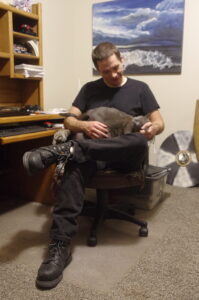
Mandy: For those who might not know you, could you introduce yourself and describe what genre of books you write?
Dodge: I was born in northern Illinois, but my family moved to southern Missouri where I grew up. I’m an introvert, and I filled my time with reading and writing during my formative years. I have written a collection of novels set in space called Embers of Hope. I’m also working on a fantasy duology called Humble Glory, and the second installment, Gentle Fury, will be released soon.

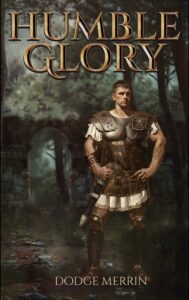
Mandy: The last time we spoke, you were working on Humble Glory, would you mind talking a little bit about that?
Dodge: The primary theme of Humble Glory was inspired by the quote, “Humility is not weakness, but strength under control,” (A. R. Bernard). I wanted to explore this concept a bit and eventually settled on a Romanesque setting instead of a medieval setting.
The main character was trained as a warrior in an order where the seeking of fame and fortune is frowned upon. They believe in protecting and uplifting those who have little to no power. However, the main character has natural talents and strength and has never lost a fight against his peers. He viewed the code of honor as holding him back, an attitude which nearly got him killed. This sets the stage for his journey into learning humility. Humble Glory released at the end of June and is available as a paperback and eBook.
The sequel to Humble Glory is called Gentle Fury. The primary antagonists in the first book are controlled by a mysterious power that is only hinted at in the first book, but the second book in the duology explores this topic, revealing who the real “bad guys” are and their motives. This is where the fantasy aspects of the genre come into play.
Mandy: What other projects are you currently working on?
Dodge: I’m also working on a trilogy of novellas, Rising Shadows, that are paranormal- and thriller-based, set in a present day with an alternative earth setting. Lately, I’ve been wanting to dig more into thriller/suspense writing. When writing these types of scenes in the past, I found myself enjoying the process more than I expected and have been wanting to write more suspenseful stories ever since. These books follow a group of teenagers who live on a Native American reservation, who are dealing with the supernatural in their hometown.
I’m also creating an audio series set ten years after the Embers of Hope that will be released on YouTube and resolves some of the things that were left open-ended at the conclusion of the series. Additionally, I’ve been working on re-releasing the individual books in the Embers of Hope series with newer cover art, formatting, and trim sizes.
Dodge’s writing style
Mandy: Let’s talk a little bit about your writing style. One of my favorite things I love about your books is the way you treat female characters. Now, I’ve read a LOT of books, and I’ve noticed that some male authors seem to miss the mark when crafting prose from a female’s perspective. Can you explain your thought process, and how you write from a different person’s perspective – especially someone with different life experiences?
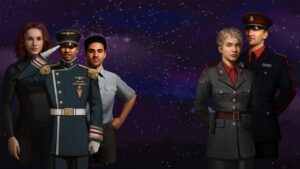
Dodge: Well, I put myself in their situation: what would I be thinking, feeling, or doing? I remember reading memes about other male authors, and I’ve seen it myself when reading books and noticed that sometimes male authors focus too much on a female character’s physical attributes. For example, if I’m walking down the stairs, I’m not going to be focusing on what my body is doing, why would a female character do the same? I basically just treat my female characters as human beings.
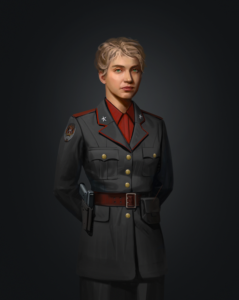
In Embers of Hope the female characters were in the military, so it was relatively easy to write them because they had similar motives as their male counterparts. In Humble Glory, I gave myself a new challenge because the female characters live during a time where their gender roles are more submissive. In ancient times, women were often treated as secondary citizens; however, I wanted to write a primary female protagonist who has strength while remaining in her traditional role. I wanted to show that she can have strength and intelligence without necessarily being a kick-butt, physically strong, warrior type. She learns to find her voice and to stand up against bullying.
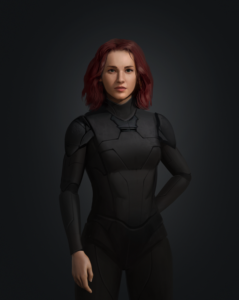
As for character art, I purposefully chose not to commission the art to feature female leads in an overly sexual way. I wanted to respect these characters as who they were. I realize I could have taken the opportunity to have them posed in a sexy way in order to influence sales, but I didn’t want to objectify them. I want my readers to see them as real characters.
And finally…
Mandy: If you had any advice to give aspiring authors, what would you like to tell them?
Dodge: Know whether you’re writing art or a product. If you are writing art, don’t worry too much about people’s grand claims of what will sell more. As an example, the decision I made to not have my female characters displayed in a sexual fashion was a decision I made because I wanted to write art, not a product. I made this decision not to get more sales, but to be true to the art form.
Mandy: Where can readers find your work?
Dodge: Amazon
Mandy: Where can readers follow you to stay updated
Dodge: YouTube channel (Audio short stories playlist), Facebook, and Instagram
Thanks for reading! I enjoyed interviewing this author and look forward to interviewing more authors in the near future! Dodge Merrin provided the following excerpt from his book, Humble Glory:
Two or three hours after their departure, Raldus suddenly dropped his pack and drew his sword, causing her to stop short just behind him to his left. She followed his gaze to see something up ahead in the ditch on the right, but she couldn’t make out what.
“Drop that and stay close to me,” he instructed. She set her bag next to his, then stayed a foot or two behind him as he walked up to the object.
Upon drawing closer, she was finally able to see that it was an overturned cart, and shortly after that, a strong metallic scent nearly overpowered her sense of smell. A few more steps revealed a man in the ditch with an arrow in his chest, and she clasped a hand over her mouth to suppress a gasp.
“Wait here,” Raldus ordered, so she waited in the road as he walked around the cart, then wandered around in the grass, alert for any danger. She watched him as he stopped to inspect something on the ground, deliberately focusing her attention on him and not staring at the poor man in front of her. When he circled back around to the road further down from the cart, he stopped again to check on something before continuing to the other side.
He sheathed his sword several minutes later and returned to her, calmer now, but with his eyes still darting to all sides and he didn’t look at her when he spoke.
“Get the bags and let’s go.”
“We can’t just leave him like that,” she protested, looking back down at the man. Although she’d never seen anyone murdered before, she had seen men mutilated and killed in farming accidents and even animals mauled by the occasional predator wily enough to get past their walls. Now that her initial shock was wearing off, she was remembering the responsibility of every decent human being.
“Whoever did this is gone, but it wasn’t that long ago. They may return.”
“That doesn’t change what we need to do.”
“Do you remember agreeing to follow my instructions?” he challenged, locking eyes with her to drive home his point with the fire in his green irises.
“Yes, but I will not leave him like this,” she insisted as she defiantly stared back.
They stayed like that for several seconds, during which she observed a multitude of emotions play out across his features. At one point, she feared he might even decide to abandon her there in his anger.
“Bring the packs up here, and be quick about it,” he commanded. She didn’t obey right away, but he stepped back, took another look around, then knelt over the man and took hold of the arrow shaft.
Realizing that he had chosen to do the right thing, she jogged back to their sacks, then dragged both of them to the cart. By the time she returned, Raldus had removed the arrow, rolled the man onto his back, and crossed his arms over his chest.
“Get a blanket from your kit, wrap him in it, and tie it tight. If at any point you sense something is wrong, cry out as loud as you can,” he instructed as he untied his own bag. Her only response was to do as she was told and dig into her sack for one of the spare blankets while he pulled out two blankets of his own.
He walked off into the grass while she set to work covering this man whom she’d never met but whose earthly vessel still deserved her respect. They didn’t have any rope to spare, so the best she could do to tie the top and bottom was to fold and tuck the corners into one another.
She was just finishing up when Raldus returned and set down another body below the first.
“There was another one?” Ariela gasped as he was still crouched over it.
“Two more. A woman and another man who was probably a hired guard,” he explained as he straightened up.
“What happened here?” she whispered, more to express disbelief than ask an actual question, but her companion took it to be the latter.
“They’re dead. That’s all you need to know,” he snapped, then left again, presumably to fetch the other body. She uttered a quick prayer asking for strength and patience, then finished her work and moved on to check his handiwork on the second body, only to find all was as it needed to be.
“That does it. Let’s go,” the warrior concluded after setting the third victim at the feet of the second.
“No, we aren’t finished,” Ariela argued.
“That’s the best we can do for now. We don’t have a shovel to dig graves nor are there enough stones around here to cover them. Let’s go!” he insisted with a tone that said he would tolerate no more discussion. She hated to do it, but she had to trust him, so she stood up, brushed the dirt from the front of her dress, then picked up her bag and followed him as he set a rapid pace away from the carnage.
“Someone else will come upon them later and finish what we started. A legion patrol if nothing else,” he assured her, then both were silent as they continued on their journey. (Chapter 12: Pages 102 – 104)

